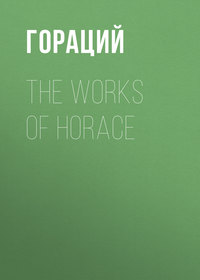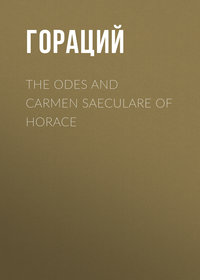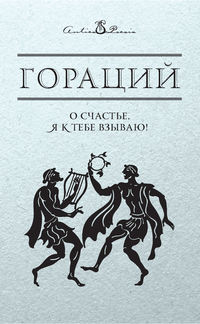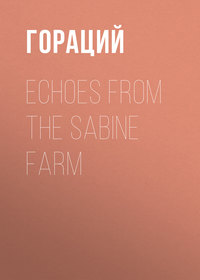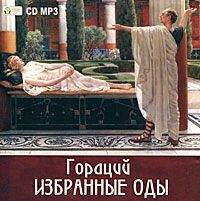
The Art of Poetry: an Epistle to the Pisos
The cyclops of Euripides, the only Satyrick drama extant, written at a much later period, than that of which Horace speaks in this place, cannot, I think, convey to us a very exact idea of the Tragick Pastorals, whose origin he here describes. The cyclops, scarce exceeding 700 lines, might be played, according to the idea of some criticks, after another performance: but that cannot, without the greatest violence to the text, be supposed of the Satyrick piece here mentioned by Horace. The idea of farces, or after-pieces, tho' an inferior branch of the Drama, is, in fact, among the refinements of an improved age. The writers of an early period throw their dramatick materials, serious and ludicrous, into one mass; which the critical chymistry of succeeding times separates and refines. The modern stage, like the antient, owed its birth to the ceremonies of Religion. From Mysteries and Moralities, it proceeded to more regular Dramas, diversifying their serious scenes, like the Satyrick poets, with ludicrous representations. This desire of variety was one cause of the agrestes satyros. Hos autem loco chori introductor intelligit, non, us quidam volunt, in ipsa tragoedia, cum praesertim dicat factum, ut grata novitate detinerentur spectatores: quod inter unum & alterum actum sit, chori loco. in tragoedia enim ipsa, cum flebilis, severa, ac gravis sit, non requiritur bujusmodi locorum, ludorumque levitas, quae tamen inter medios actus tolerari potest, & boc est quod ait, incolumi gravitate. Ea enim quae funt, quaeve dicuntur inter medios actus, extra tragordiam esse intelligentur, neque imminuunt tragoedioe gravi*tem.—DE NORES.
The distinction made by De Nores of the satyrs not making a part of the tragedy, but barely appearing between the acts, can only signify, that the Tragick and Comick Scenes were kept apart from each other. This is plain from his laying that they held the place of the Chorus; not sustaining their continued part in the tragick dialogue, but filling their chief office of singing between the acts. The antient Tragedy was one continued representation, divided into acts by the Chant of the CHORUS; and, otherwise, according to modern ideas, forming but one act, without any interruption of the performance.
These antient Satyrick songs, with which the antient Tragedians endeavoured to enliven the Dithyrambicks, gave rise to two different species of poetry. Their rude jests and petulant raillery engendered the Satire; and their sylvan character produced the Pastoral.
328.—THO' RUDE, THE GRAVER MOOD UNBROKE—Stript the rough Satyrs, and ESSAYED A JOKE—Agrestes Satyros nudavis, & asper,INCOLUMI GRAVITATE, jocum tentavit.
"It hath been shewn, that the poet could not intend, in these lines, to fix the origin of the satiric drama. But, though this be certain, and the dispute concerning that point be thereby determined, yet it is to be noted, that he purposely describes the satire in its ruder and less polished form; glancing even at some barbarities, which deform the Bacchic chorus; which was properly the satiric piece, before Aeschylus had, by his regular constitution of the drama, introduced it under a very different form on the stage. The reason of this conduit is given in n. on l. 203. Hence the propriety of the word nudavit, which Lambin rightly interprets, nudos introduxit satyres, the poet hereby expressing the monstrous indecorum of this entertainment in its first unimproved state. Alluding also to this ancient character of the satire, he calls him asper, i.e. rude and petulant; and even adds, that his jests were intemperate, and without the least mixture of gravity. For thus, upon the authority of a very ingenious and learned critic, I explain incolumi gravitate, i. e. rejecting every thing serious, bidding farewell, as we may say, to all gravity. Thus [L. in. O. 5.].
Incolumi Jove et urbe Româ:i.e. bidding farewell to Jupiter [Capitolinus] and Rome; agreeably to what is said just before,
Anciliorum et neminis et togaeOBLITUS, aeternaeque Vestae.or, as salvus is used more remarkably in Martial [I. v. 10.]
Ennius est lectus salvo tibi, Roma, Marone: Et sua riserunt secula Maeonidem."_Farewell, all gravity, is as remote from the original sense of the words fare well, as incolumi gravitate from that of incolumis, or salvo Morona from that of salvas."
Notes on the Art of Poetry.
The beginning of this note does not, I think, perfectly accord with what has been urged by the same Critick in the note immediately preceding; He there observed, that the "satyr here spoken of, is, in all respects, a regular Drama, and therefore could not be of earlier date, than the times of Aeschylus.
Here, however, he allows, though in subdued phrase, that, "though this be certain, and the dispute concerning that point thereby determined,_ yet it is to be noted, that he purposely describes the satyr in its ruder and less polished form; glancing even at some barbarities, which deform the bacchic chorus; which was properly the Satyrick piece, before Aeschylus had, by his regular constitution of the Drama, introduced it, under a very different form, on the stage." In a subsequent note, the same learned Critick also says, that "the connecting particle, verum, [verum ita risores, &c.] expresses the opposition intended between the original satyr and that which the Poet approves." In both these passages the ingenious Commentator seems, from the mere influence of the context, to approach to the interpretation that I have hazarded of this passage, avowedly one of the most obscure parts of the Epistle. The explanation of the words incolumi gravitate, in the latter part of the above note, though favourable to the system of the English Commentary, is not only contrary to the construction of all other interpreters, and, I believe, unwarranted by any acceptation of the word incolumis, but, in my opinion, less elegant and forcible than the common interpretation.
The line of the Ode referred to,
INCOLUMI Jove, et urbe Româ?
was never received in the sense, which the learned Critick assigns to it.
The Dauphin Editor interprets it,STANTE urbe, & Capitolino Jove Romanos protegente.Schrevelius, to the same effect, explains it,SALVO Capitolio, quae Jovis erat sedes.These interpretations, as they are certainly the most obvious, seem also to be most consonant to the plain sense of the Poet.
330.—For holiday spectators, flush'd and wild, With new conceits and mummeries were beguil'd. Quippe erat ILLECEBRIS, &c.
Monsieur Dacier, though he allows that "all that is here said by Horace proves incontestibly, that the Satyrick Piece had possession of the Roman stage;" tout ce qu' Horace dit icy prouve incontestablement qu'il y avoit des Satyres; yet thinks that Horace lavished all these instructions on them, chiefly for the sake of the atellane fables. The author of the English Commentary is of the same opinion, and labours the point very assiduously. I cannot, however, discover, in any part of Horace's discourse on the satyrs, one expression glancing towards the atellanes, though their oscan peculiarities might easily have been marked, so as not to be mistaken.
335.—That GOD or HERO of the lofty scene, May not, &c. Ne quicumque DEUS, &c.
The Commentators have given various explanations of this precept. De Nores interprets it to signify that the same actor, who represented a God or Hero in the Tragick part of the Drama, must not be employed to represent a Faun or Sylvan in the Satyrick. _Dacier has a strange conceit concerning the joint performance of a Tragedy and Atellane at one time, the same God or Hero being represented as the principal subject and character of both; on which occasion, (says he) the Poet recommends to the author not to debase the God, or Hero of the Tragedy, by sinking his language and manners too low in the atellane; whose stile, as well as measure, should be peculiar to itself, equally distant from Tragedy and Farce.
The author of the English Commentary tells us, that "Gods and Heroes were introduced as well into the Satyrick as Tragick Drama, and often the very same Gods and Heroes, which had born a part in THE PRECEDING TRAGEDY; a practice, which Horace, I suppose, intended, by this hint, to recommend as most regular."
The two short notes of Schrevelius, in my opinion, more clearly explain the sense of Horace, and are in these words.
Poema serium, jocis Satyricis ita commiscere—ne seilicet is, qui paulo ante DEI instar aut herois in scenam fuit introductus, postea lacernosus prodeat.
On the whole, supposing the Satyrick Piece to be Tragi-Comick, as Dacier himself seems half inclined to believe, the precept of Horace only recommends to the author so to support his principal personage, that his behaviour in the Satyrick scenes shall not debase the character he has sustained in the TRAGICK. No specimen remaining of the Roman Satyrick Piece, I may be permitted to illustrate the rule of Horace by a brilliant example from the seroi-comick Histories of the Sovereign of our Drama. The example to which I point, is the character of the Prince of Wales, in the two Parts of Henry the Fourth, Such a natural and beautiful decorum is maintained in the display of that character, that the Prince is as discoverable in the loose scenes with Falstaff and his associates, as in the Presence Chamber, or the closet. after the natural, though mixt dramas, of Shakespear, and Beaumont and Fletcher, had prevailed on our stage, it is surprising that our progress to pure Tragedy and Comedy, should have been interrupted, or disturbed, by the regular monster of Tragi-comedy, nursed by Southerne and Dryden.
346.—LET ME NOT, PISOS, IN THE SYLVIAN SCENE, USE ABJECT TERMS ALONE, AND PHRASES MEAN]
Non ego INORNATA & DOMINANTIA, &c.
The author of the English Commentary proposes a conjectural emendation of Horace's text—honodrata instead of inornata—and accompanied with a new and elevated sense assigned to the word dominantia. This last word is interpreted in the same manner by de Nores. Most other Commentators explain it to signify common words, observing its analogy to the Greek term [Greek: kuria]. The same expression prevails in our own tongue—a reigning word, _a reigning fashion, &c. the general cast of the satyr, seems to render a caution against a lofty stile not very necessary; yet it must be acknowledged that such a caution is given by the Poet, exclusive of the above proposed variation.
Ne quicumque DEUS– Migret in obscuras HUMILI SERMONE tabernas, Aut dum vitat humum, NUBES & INANIA CAPTET.
350.—Davus may jest, &c.]—Davusne loquatur, &c.
It should seem from hence, that the common characters of Comedy, as well as the Gods and Heroes of Tragedy, had place in the Satyrick Drama, cultivated in the days of Horace. Of the manner in which the antient writers sustained the part of Silenus, we may judge from the CYCLOPS of Euripides, and the Pastorals of Virgil.
Vossius attempts to shew from some lines of this part of the Epistle, [Ne quicumque Deus, &c.] that the satyrs were subjoined to the Tragick scenes, not incorporated with them: and yet at the same moment he tells us, and with apparent approbation, that Diomedes quotes our Poet to prove that they were blended with each other: simul ut spectator, inter res tragicas, seriasque, satyrorum quoque jocis, & lusibus, delectaretur.
I cannot more satisfactorily conclude all that I have to urge, on the subject of the Satyrick Drama, as here described by Horace, than by one more short extract from the notes of the ingenious author of the English Commentary, to the substance of which extract I give the most full assent. "The Greek Drama, we know, had its origin from the loose, licentious raillery of the rout of Bacchus, indulging to themselves the freest follies of taunt and invective, as would best suit to lawless natures, inspirited by festal mirth, and made extravagant by wine. Hence arose, and with a character answering to this original, the Satiric Drama; the spirit of which was afterwards, in good measure, revived and continued in the Old Comedy, and itself preferred, though with considerable alteration in the form, through all the several periods of the Greek stage; even when Tragedy, which arose out of it, was brought to its last perfection."
368.—_To a short syllable, a long subjoin'd, Forms an _IAMBICK FOOT.] Syllaba longa, brevi subjetta, vocatur Iambus.
Horace having, after the example of his master Aristotle, slightly mentioned the first rise of Tragedy in the form of a Choral Song, subjoining an account of the Satyrick Chorus, that was soon (mox etiam) combined with it, proceeds to speak particularly of the Iambick verse, which he has before mentioned generally, as the measure best accommodated to the Drama. In this instance, however, the Poet has trespassed against the order and method observed by his philosophical guide; and by that trespass broken the thread of his history of the Drama, which has added to the difficulty and obscurity of this part of his Epistle. Aristotle does not speak of the Measure, till he has brought Tragedy, through all its progressive stages, from the Dithyrambicks, down to its establishment by Aeschylus and Sophocles. If the reader would judge of the poetical beauty, as well as logical precision, of such an arrangement, let him transfer this section of the Epistle [beginning, in the original at v. 251. and ending at 274.] to the end of the 284th line; by which transposition, or I am much mistaken, he will not only disembarrass this historical part of it, relative to the Grascian stage, but will pass by a much easier, and more elegant, transition, to the Poet's application of the narrative to the Roman Drama,
The English reader, inclined to make the experiment, must take the lines of the translation from v. 268. to v. 403, both inclusive, and insert them after v. 418.
In shameful silence loft the pow'r to wound.
It is further to be observed that this detail on the IAMBICK is not, with strict propriety, annext to a critical history of the SATYR, in which, as Aristotle insinuates insinuates, was used the Capering Tetrameter, and, as the Grammarians observe, Trisyllabicks.
394.—PISOS! BE GRAECIAN MODELS, &c.]
Pope has imitated and illustrated this passage.
Be Homer's works your study and delight,Read them by day, and meditate by night;Thence form your judgment, thence your maxims bring,And trace the Muses upwards to their spring.Still with itself compar'd, his text peruse!And let your comment be the Mantuan Muse!Essay on Criticism.404.—A KIND OF TRAGICK ODE, UNKNOWN BEFORE, THESPIS, 'TIS SAID, INVENTED FIRST. IGNOTUM Tragicae GENUS INVENISSE Camaenae Dicitur, &c.
It is surprising that Dacier, who, in a controversial note, in refutation of Heinsius, has so properly remarked Horace's adherence to Aristotle, should not have observed that his history of the Drama opens and proceeds nearly in the same order. Aristotle indeed does not name Thespis, but we cannot but include his improvements among the changes, to which the Critick refers, before Tragedy acquired a permanent form under AEschylus. Thespis seems not only to have embodied the CHORUS, but to have provided a theatrical apparatus for an itinerant exhibition; to have furnished disguises for his performers, and to have broken the continuity of the CHORUS by an Interlocutor; to whom AEschylus adding another personage, thereby first created Dramatick Dialogue; while at the same time by a further diminution of the CHORUS, by improving the dresses of the actors, and drawing them from their travelling waggon to a fixt stage, he created a regular theatre.
It appears then that neither Horace, nor Aristotle, ascribe the origin of Tragedy to Thespis. the Poet first mentions the rude beginning of Tragedy, (carmen tragicum) the Goat-song; he then speaks of the Satyrick Chorus, soon after interwoven with it; and then proceeds to the improvements of these Bacchic Festivities, by Thespis, and AEschylus; though their perfection and final establishment is ascribed by Aristotle to Sophocles. Dacier very properly renders this passage, On dit que Thespis fut le premier jui inventa une especi de tragedie auparavant inconnue aux Grecs. Thespis is said to be the first inventor of a species of Tragedy, before unknown to the Greeks.
Boileau seems to have considered this part of the Epistle in the same light, that I have endeavoured to place it.
La Tragedie informe & grossiere au naissant n'etoit qu'un simple Choeur, ou chacun en danfant, et du Dieu des Raisins entonnant les louanges, s'essorçoit d'attirer de fertiles vendanges. la le vin et la joie eveillant les esprits, du plus habile chantre un Bouc étoit le prix. Thespis sut le premier, qui barbouillé de lie, promena par les bourgs cette heureuse folie; et d'acteurs mal ornés chargeant un tombereau, amusa les passans d'un spectacle nouveau. aeschyle dans le Choeur jetta les personages; d'un masque plus honnéte habilla les visages: sur les ais d'un Theatre en public exhaussé, fit paroitre l'acteur d'un brodequin chaussé.
L'art poetique, chant troisieme.
417.—the sland'rous Chorus drown'd In shameful silence, lost the pow'r to wound.
Chorusque turpiter obticuit, sublato jure nocendi.
"Evidently because, though the jus nocendi was taken away, yet that was no good reason why the Chorus should entirely cease. M. Dacier mistakes the matter. Le choeur se tût ignominuesement, parce-que la hi reprimasa licence, et que ce sut, à proprement parler, la hi qui le bannit; ce qu' Horace regarde comme une espece de siétrissure. Properly speaking, the law only abolished the abuse of the chorus. The ignominy lay in dropping the entire use of it, on account of this restraint. Horace was of opinion, that the chorus ought to have been retained, though the state had abridged it of the licence, it so much delighted in, of an illimited, and intemperate satire, Sublatus chorus fuit, says Scaliger, _cujus illae videntur esse praecipuae partet, ut potissimum ques liberet, laedertnt."
Notes on the Art of Poetry._ If Dacier be mistaken in this instance, his mistake is common to all the commentators; not one of whom, the learned and ingenious author of the above he excepted, has been able to extract from these words any marks of Horace's predilection in favour of a Chorus, or censure of "its culpable omission" in Comedy. De Nores expresses the general sense of the Criticks on this passage.
[Turpiter.] Quia lex, declaratâ Veteris Conaetdiae scriptorum improbitate, a maledicendi licentiâ deterruit.—Sicuti enim antea summâ cum laude Vetus Comediae, accepta est, ita postea summa est cum turpitudine vetantibus etiam legibus repudiata, quia probis hominibus, quia sapientibus, quia inte*s maledixerit. Quare Comaediae postea conscriptae ad hujusce Veteris differentiam sublato choro, novae appellatae sunt.
What Horace himself says on a similar occasion, of the suppression of the Fescennine verses, in the Epistle to Augustus, is perhaps the best comment on this passage.
—quin etiam lexPaenaque lata, malo quae nollet carmine quenquam—describi: vertere modum formindine fustisad bene dicendum delectandumque redacti.421.–Daring their Graecian masters to forsake,And for their themes domestick glories take.Nec minimum meruere decus, vestigia GraecaAusi deserere, & celebrare domestica facta.
The author of the English Commentary has a note on this passage, replete with fine taste, and sound criticism.
"This judgment of the poet, recommending domestic subjects, as fittest for the stage, may be inforced from many obvious reasons. As, 1. that it renders the drama infinitely more affecting: and this on many accounts, 1. As a subject, taken from our own annals, must of course carry with it an air of greater probability, at least to the generality of the people, than one borrowed from those of any other nation. 2. As we all find a personal interest in the subject. 3. As it of course affords the best and easiest opportunities of catching our minds, by frequent references to our manners, prejudices, and customs. And of how great importance this is, may be learned from hence, that, even in that exhibition of foreign characters, dramatic writers have found themselves obliged to sacrifice sacrifice truth and probability to the humour of the people, and to dress up their personages, contrary to their own better judgment, in some degree according to the mode and manners of their respective countries [Footnote: "L'etude égale des poëtes de différens tems à plaire à leurs spectateurs, a encore inssué dans la maniere de peindre les caracteres. Ceux qui paroissent sur la scene Angloise, Espagnols, Françoise, sont plus Anglois, Espagnols, ou François que Grecs ou Romains, en un mot que ce qu'ils doivent être. II ne faut qu'en peu de discernement pour s'appercevoir que nos Césars et nos Achilles, en gardant même un partie de leur charactere primitif, prennent droit de naturalité dans le païs où ils sont transplantez, semblables à ces portraits, qui sortent de la main d'un peintre Flamand, Italien, ou François, et qui portent l'empreinte du pais. On veut plaire à sa nation, et rien ne plait tant que le resemblance de manieres et de enie." P. Brumoy, vol. i. p. 200.] And, 4. as the writer himself, from an intimate acquaintance with the character and genius of his own nation, will be more likely to draw the manners with life and spirit.
"II. Next, which should ever be one great point in view, it renders the drama more generally useful in its moral destination. For, it being conversant about domestic acts, the great instruction of the fable more sensibly affects us; and the characters exhibited, from the part we take in their good or ill qualities, will more probably influence our conduct.
"III. Lastly, this judgment will deserve the greater regard, as the conduct recommended was, in fact, the practice of our great models, the Greek writers; in whose plays, it is observable, there is scarcely a single scene, which lies out of the confines of Greece.
"But, notwithstanding these reasons, the practice hath, in all times, been but little followed. The Romans, after some few attempts in this way (from whence the poet took the occasion of delivering it as a dramatic precept), soon relapsed into their old use; as appears from Seneca's, and the titles of other plays, written in, or after the Augustan age. Succeeding times continued the same attachment to Grecian, with the addition of an equal fondness for Roman, subjects. The reason in both instances hath been ever the same: that strong and early prejudice, approaching somewhat to adoration, in favour of the illustrious names of those two great states. The account of this matter is very easy; for their writings, as they furnish the business of our younger, and the amusement of our riper, years; and more especially make the study of all those, who devote themselves to poetry and the stage, insensibly infix in us an excessive veneration for all affairs in which they were concerned; insomuch, that no other subjects or events seem considerable enough, or rise, in any proportion, to our ideas of the dignity of the tragic scene, but such as time and long admiration have consecrated in the annals of their story. Our Shakespeare was, I think, the first that broke through this bondage of classical superstition. And he owed this felicity, as he did some others, to his want of what is called the advantage of a learned education. Thus uninfluenced by the weight of early prepossession, he struck at once into the road of nature and common sense: and without designing, without knowing it, hath left us in his historical plays, with all their anomalies, an exacter resemblance of the Athenian stage, than is any where to be found in its most processed admirers and copyists.


